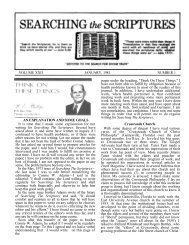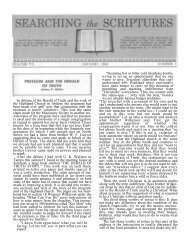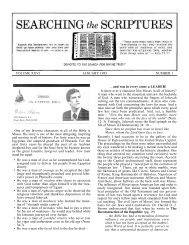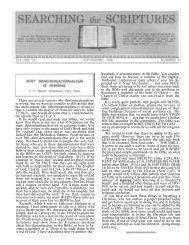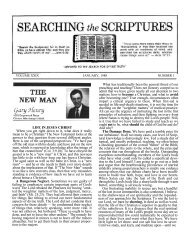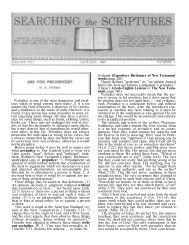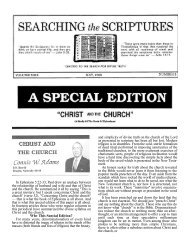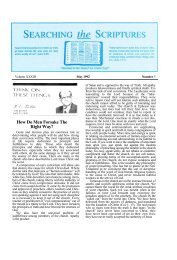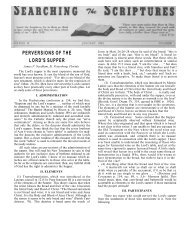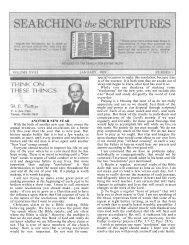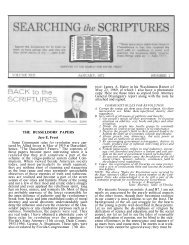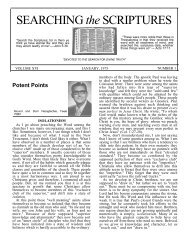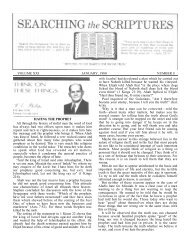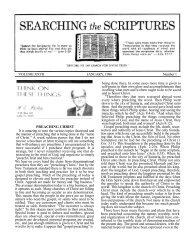Volume 31 – 1990 (PDF) - Searching The Scriptures
Volume 31 – 1990 (PDF) - Searching The Scriptures
Volume 31 – 1990 (PDF) - Searching The Scriptures
Create successful ePaper yourself
Turn your PDF publications into a flip-book with our unique Google optimized e-Paper software.
Page 6<br />
EVANGELISM THAT MAKES SENSE<br />
If there has been any point of emphasis thus far in our<br />
study of the church at Antioch described in Acts chapters<br />
11, 13, 14 it is this: God did not pick the Antioch<br />
church out of a hat by saying, "Someone has got to make<br />
an impact in the world and it might as well be Antioch...<br />
" Rather, God used the Antioch church to make an<br />
impact BECAUSE THE ANTIOCH CHURCH WAS<br />
READY TO BE USED! Having committed themselves<br />
to growth and stability first at home, they were now<br />
ready to sacrifice for the benefit of those in unharvested<br />
fields. And they, as a result of their association with<br />
Paul and Barnabas, were able to send out two men<br />
whom they knew and could trust (13: 1-4).<br />
Look again at that last sentence. Two men whom<br />
they knew and could trust... Let's take time out<br />
from that first preaching journey to reflect upon two<br />
impor-tant points regarding evangelism that we see<br />
in the Antioch model. Two points that are often<br />
overlooked.<br />
Principle #1 — From Church to Preacher<br />
First, New Testament evangelism was<br />
carried out by qualified men. God never asked<br />
the Antioch church to send out men they did not<br />
know. In the selection of Paul and Barnabas (Acts 13:<br />
2), the Lord was laying down an evangelistic principle<br />
that every church should emulate when it seeks to<br />
preach the gospel in distant places. That principle:<br />
have fellowship with those you know and trust.<br />
I wonder... (and maybe you have too... ) how much<br />
money churches pour down rat holes simply because<br />
they do not take the time to know the men they support?<br />
<strong>The</strong> fact is: Not every man who writes and asks for<br />
support is worthy of support! Common sense, as well as<br />
the Antioch example, says that no church should support<br />
a man unless they have absolute confidence in him.<br />
Either he is known directly or indirectly (i. e., through<br />
the recommendation of someone else in whom they have<br />
confidence).<br />
Every local church will have to make its own decisions<br />
regarding whom they support in other places. It's<br />
not my business nor anyone else's. But let me make a<br />
couple of observations that may be worthy of further<br />
study.<br />
I've noticed a few churches that appear to take a<br />
certain amount of pride at being able to say, "We<br />
support fifteen preachers!" (Which usually means, we<br />
support fifteen preachers one hundred dollars<br />
per month. ) Question: Of those fifteen men, how many<br />
are really known by the church? Sometimes, outside of an<br />
occasional letter posted on the bulletin board, few, if any,<br />
have had any real and meaningful contact with the men<br />
they support.<br />
Surely it's not always possible to invite every man a<br />
church supports to come in and talk with the elders and<br />
brethren about their work. But nothing precludes an<br />
elder (or someone else) traveling to where the man<br />
preaches to visit him and his family and thereby gain a<br />
first-hand impression about the work. And nothing precludes<br />
a local church paying the expenses of one who<br />
travels for that purpose. I know of several churches<br />
where this principle is put into practice. <strong>The</strong>y, and the<br />
men they support, are the better for it.<br />
What this principle also means is that there may be<br />
more wisdom in supporting fewer men with greater<br />
amounts than many men with lesser amounts. I'm seeing<br />
more and more churches make longer and greater financial<br />
commitments to a few men they have confidence in<br />
rather than stringing out minimum support to a greater<br />
number. It's an area that calls for much prayer as leaders<br />
seek to be responsible for resources under their direction.<br />
Elders need to approach efforts at outside evangelism by:<br />
1. Asking for God-directed wisdom (James 1: 5).<br />
2. Employing good common sense (Matthew 10: 16).<br />
3. Remembering the responsibilities of stewardship,<br />
(Titus 1: 7).<br />
Principle #2 — From Preacher to Church<br />
Second, a church ought not to support a man<br />
who is unwilling to communicate consistently.<br />
Note in 14: 27 that upon their return Paul and Barnabas<br />
gathered the church and "reported all things that God<br />
had done with them... "<br />
My good brother, if you are laboring in a place where<br />
you receive support from other churches, you should be<br />
responsible enough to keep those brethren informed<br />
about your work. If nothing else, common courtesy and<br />
integrity should demand it. Do not view such as a waste<br />
of your time or an infringement upon a busy schedule. If<br />
there are churches willing to take the time to commit to<br />
your needs and write a monthly check, the least you could<br />
do is take the time to communicate in return.<br />
Obviously some preachers know the value of that.<br />
Others are rather, shall we say, lax (I was looking for a<br />
kind way to say negligent. ). A man should be disciplined<br />
and responsible enough to periodically write a brief<br />
report concerning his work. And if a brother does not<br />
respond diligently in that area... well, it makes you<br />
wonder how diligent he may be in other areas. (I'm not<br />
particularly impressed by reading letters on bulletin<br />
boards that always begin with: "I apologize for not writing<br />
sooner... ") I like what brother Aude McKee said as we<br />
talked on this subject sometime back. He said, "My<br />
attitude has always been pretty simple: if a fellow isn't<br />
willing to send a monthly report he shouldn't expect a<br />
monthly check. " That's pretty clear.<br />
And I've been there. On the receiving end. And I know<br />
that churches appreciate being kept informed. I would<br />
trust that if a congregation cared enough about me to<br />
render financial support then surely the very least I owe



